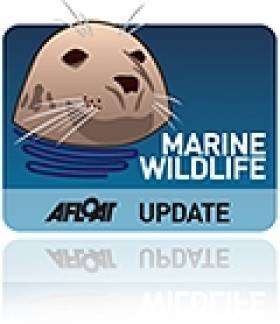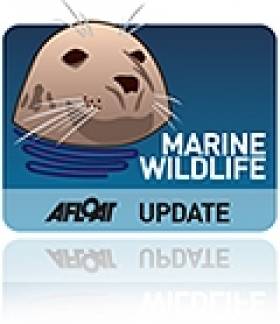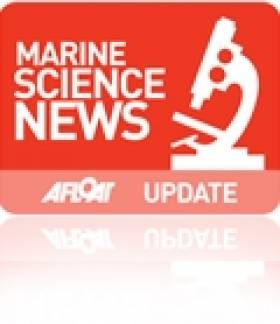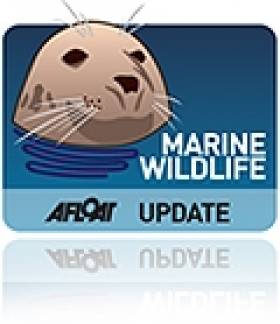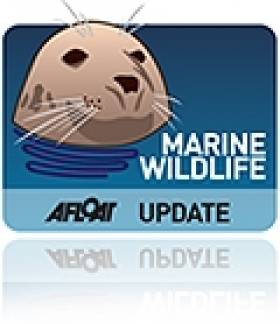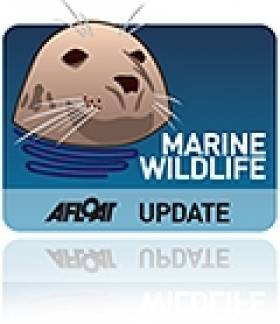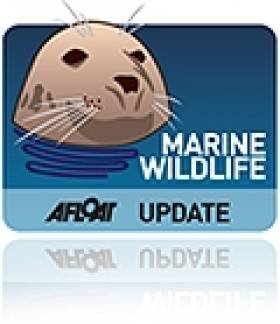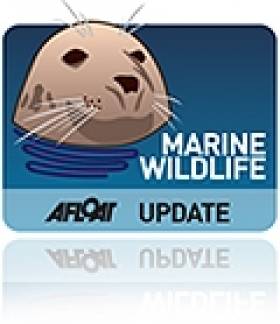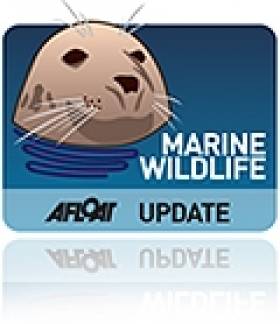Displaying items by tag: Dolphin
Dolphin Post Mortems Raise Concern Over Trawler Bycatch
At the end of January 2013, over a one week period, 13 common dolphins were found dead along the Mayo coast. The situation was considered sufficiently unusual to warrant further investigation. The Department of Arts, Heritage and the Gaeltacht commissioned a specialist cetacean veterinarian team to carry out post-mortem examinations on five of the animals. This work was undertaken in Athlone at the Regional Veterinary Laboratories of the Department of Agriculture, Food and the Marine.
There was evidence consistent with entanglement in fishing gear apparent in each animal and the post-mortem findings in all five animals are thought to be most consistent with accidental bycatch in trawl type fishery gear. Common dolphins are plentiful in Irish waters and the Celtic Sea, but are at risk of accidental bycatch by trawling, as they may feed on fish shoals very close to boats.
They are one of twenty four species of cetacean that occur in Ireland and are subject to strict protection under national and international legislation. Minister Deenihan said "I am concerned by any killing of these species, even where accidental. A meeting has been agreed between my officials and the Department of Agriculture, Food and the Marine to examine what further actions may be taken to minimise the risks to dolphins". Minister Coveney shared the concerns of Minister Deenihan and acknowledged "In addition to our own boats, many other European fleets operate in Irish waters, an area that is intensely fished. On the basis of these examinations, it is not possible to determine which of these fleets might have been involved in this incident. The results of these post mortems certainly remind us of the need to further our efforts to reduce incidental by-catch to the lowest possible level across all EU and third country fleets fishing in waters around Ireland".
Tangled Dolphin Seeks Help From Divers
#MarineWildlife - The Irish Examiner reports on the extraordinary story of a bottlenose dolphin who turned to a group of divers for help to free it from a fishing line.
The video above captures the touching scene when the cetacean approached the divers as they filmed a group of manta rays in the Pacific waters near Kona in Hawaii.
As the footage shows, the dolphin positioned itself in such as way as to allow diver Keller Laros to cut the fishing tackle that was tangled tightly around its midsection and remove the hook from its left pectoral fin.
After the dolphin took to the surface for a quick breather, the divers were able to free it from the line and allow it to swim away unharmed.
Research Vessel Explorer Departs on Dolphin Survey Mission
#marinescience – Scientists from GMIT's Marine and Freshwater Research Centre will depart Galway today on board the RV Celtic Explorer to carry out the fourth dedicated survey of cetaceans on the continental shelf edge. The trip will determine if a distinct population or 'eco-type' of bottlenose dolphin exists in offshore waters, as suggested by DNA analysis, photo-identification and behavioural traits observed in previous surveys.
'Cetaceans on the Frontier,' an annual research cruise since 2008, lead jointly by Galway-Mayo Institute of Technology (GMIT) and the Irish Whale and Dolphin Group (IWDG) records the number and distribution of whales, dolphins and porpoises along the continental shelf edge. The region is an important habitat for cetaceans because of the rich food resources available from increased productivity caused by upwelling when nutrients are brought to the surface from the depths.
This project aims to identify particular areas of importance for cetaceans as well as other species such as seabirds, with this survey focusing in particular on the bottlenose dolphin.
GMIT Marine Scientist and lecturer Dr Joanne O'Brien, says: "While many people are familiar with coastal bottlenose dolphins that are resident in the Shannon Estuary, or those which occasionally venture into bays and harbours during summer months, little is known about their offshore counterparts."
Mr Conor Ryan, the chief scientist on this survey, and member of the Irish Whale and Dolphin Group, says, "The bottlenose dolphin is required to have strict protection under the EU Habitats Directive but this is difficult to achieve for animals living offshore as we know little about their ecology, movements and the threats that they may face."
"As in 2012, we will take skin samples from these dolphins by deploying a small boat from the Celtic Explorer using a biopsy darting system to collect skin samples for DNA analysis, under licence from the National Parks and Wildlife Service. We will photograph their uniquely marked dorsal fins and catalogue individuals' movements. We also hope to characterise their preferred habitat type, e.g. their preferred depth and distance from the shelf edge."
Cetaceans on the Frontier is an inter-disciplinary research cruise, and scientists specialising in seabird biology, plankton and micro-plastics will also be collecting data in order to determine how different species are interacting with their environment and with each other. Last year the bird team recorded a rare black-browed albatross, tens of thousands of kilometres from its native Southern Ocean.
The micro-plastics research team, based in GMIT, aims to investigate how prolific plastic pollution is in the ocean, particularly in deep waters far from the sources of dumping. Zooplankton (including jellyfish such as the mauve stinger) will be collected in small nets and analysed for chemical tracers called stable isotopes which help ecologists to model food-webs including the diets and even movements of larger predators such as fish, birds and cetaceans.
Scientists from GMIT, IWDG, BirdWatch Ireland, Queens University Belfast, National Oceanographic Centre Southampton, University College Cork and University of La Rochelle will spend two weeks at sea, zig-zagging along the shelf edge from Co. Donegal to Co. Cork. The survey is funded through the Marine Institute's National Research Vessel Ship –Time Programme 2013 supported by the Marine Research Sub-programme of the National Development Plan 2007–2013.
Twitter Fears Unfounded as Dingle's Fungie is Alive and Flipping
#FUNGIE - He was the subject of rumours of his demise earlier this week - but the people of Dingle say their most famous resident, Fungie the dolphin, is alive and flipping.
A spokeswoman for Dingle Dolphin Boat Tours confirmed to The Daily Edge that Fungie is "definitely alive", and that no dolphin remains had washed up on the beach, as had been claimed on Twitter last Monday morning.
The Co Kerry fishing village is celebrating 30 years of the bottlenose dolphin's residency in its harbour. It's unclear exactly how old Fungie is, but it's presumed he was born in the mid 1970s.
Irish Central has more on the story HERE.
Thirty Years of Fungie's Frolics in Dingle
#FUNGIE - A new video posted to YouTube celebrates 30 years of Fungie the dolphin in Dingle.
The male bottlenose dolphin appeared from out of nowhere in the Co Kerry fishing village in 1983 and soon made it his home, quickly becoming an integral part of the local community.
Since his arrival Fungie has made friends and warmed hearts with people both local and across the world, such as Dutch couple Jeannine Masset and Rudi Schamhart who have been meeting him for more than 20 years.
Meanwhile, locals hope that new measures for harbour users proposed earlier this year won't bring an end to boat trips to meet Dingle's most famous resident.
Divers Meet Dusty the Doolin Dolphin
#MARINE WILDLIFE - A hat-tip goes to WorldIrish for this video posted on Vimeo by Monty Cantson capturing the moment when a playful dolphin paid a visit to a group of divers in Bones Bay at Doolin, Co Clare recently.
According to Lahinch Surf Experience, the bottlenose dolphin goes by the name of Dusty, after the singer Dusty Springfield.
The female cetacean has been a fixture of the area for more than a decade, and while apparently less friendly than Dingle's famous Fungie - she doesn't like to be touched - she seems happy to swim beside swimmers and divers, and loves to play with anything you might have in the water with you!
Carcass of Rescued 'Dolphin' Found Beached in Dundalk
#MARINE WILDLIFE - The body of a porpoise washed up on a beach near Dundalk recently is believed to be one of two 'dolphins' rescued from the area just days before.
The Dundalk Democrat reports that the porpoise carcass was discovered by Blackrock Tidy Towns supervisor Pat Rafferty while on a litter patrol of the beach on Tuesday 3 June.
“It must have beached on Monday night sometime, as we would have seen it the day before," he said. "Unfortunately it seems that gulls had got to it.”
Rafferty added: "“Maybe if it had beached during the day we would have been able to rescue it.”
It's thought that the porpoise is one of the two 'dolphins' that were rescued from the shallows by local people and the DunDalk Sub Aqua Team during the Blackrock Raft Race on 25 June.
Harbour porpoises - one of the most common forms of marine wildlife in Ireland - are very similar in apperance to dolphins but have a more triangular dorsal fin and lack the dolphin's beak-like snout.
The Dundalk Democrat has more on the story HERE.
New Harbour Charges Could End Trips to See Fungie
#IRISH HARBOURS - "Draconian" new charges for harbour users could bring an end to boat trips to see Dingle's most famous resident, according to The Irish Times.
Fungie the dolphin has been a mainstay of Dingle harbour for almost 30 years, but boat trips to visit him could cease to operate "with immediate effect" if charges of up to €9,000 are imposed "in advance" of the season.
Currently operators in the Dingle Boatmen's Association pay around €2,500 to use the harbour at the end of each season.
Association chairman Jimmy Flannery called on anyone working in tourism in Ireland to make submissions to the public consultation before the deadline next Friday 20 April.
As previously reported on Afloat.ie, yacht owners are also up in arms over the new charges proposed by Marine Minister Simon Coveney that could see their rates hiked by an incredible 800 per cent.
And the news comes not long after fellow Kerry harbour users protested proposed new bylaws to regulate their activities and impose new charges.
Fears Over Illegal Cull as Seals, Dolphin Die on Waterford Beach
#MARINE WILDLIFE - Fears are growing of an illegal cull of marine wildlife after a seal and dolphin were discovered dead on a Waterford beach - just hours after two seals were found dying from bullet wounds in the same location.
TheJournal.ie reports that the wounds on the two animals found on Tramore Beach on Thursday are also believed to be from gunshot.
Two grey seals were euthanised the previous evening after they were discovered gravely injured with "horrific" wounds on the same beach.
A spokesperson for the Irish Seal Sanctuacy (ISS) has called for a post-mortem of the animals to determine the exact cause of death - but pointed the finger at an illegal cull allegedly carried out by local fishermen.
"We’re not against a properly regulated cull," said the ISS's Johnny Woodlock, "but it’s the guy who goes out with a shotgun and takes potshots, that’s what we’re against.”
TheJournal.ie has more on the story HERE, including an image that many may find distressing.
First Sighting of a Dolphin in an Irish Lake
#MARINE WILDLIFE - The first recorded sighting of a dolphin in an Irish lake has been reported by the Irish Whale and Dolphin Group (IWDG), according to The Irish Times.
The dolphin was spotted in Lough Hyne, a saltwater lake near Baltimore in Co Cork by Skibbereen-based kayaking instructor Jim Kennedy, who filmed it over a number of days.
"To the best of my knowledge, and I’m open to correction, this is the first validated record of a cetacean using an Irish lake," said the IWDG's Pádraig Whooley.
Though there have been no further sightings since then, there is nothing to indicate that the dolphin has yet left the lough for the open sea.
As previously reported on Afloat.ie, Lough Hyne was also recently visited by a 13-metre fin whale that was sadly found beached in stormy conditions on the Sligo coast this week.
The Irish Times has more on the story HERE.

